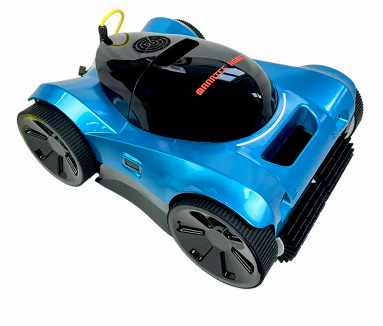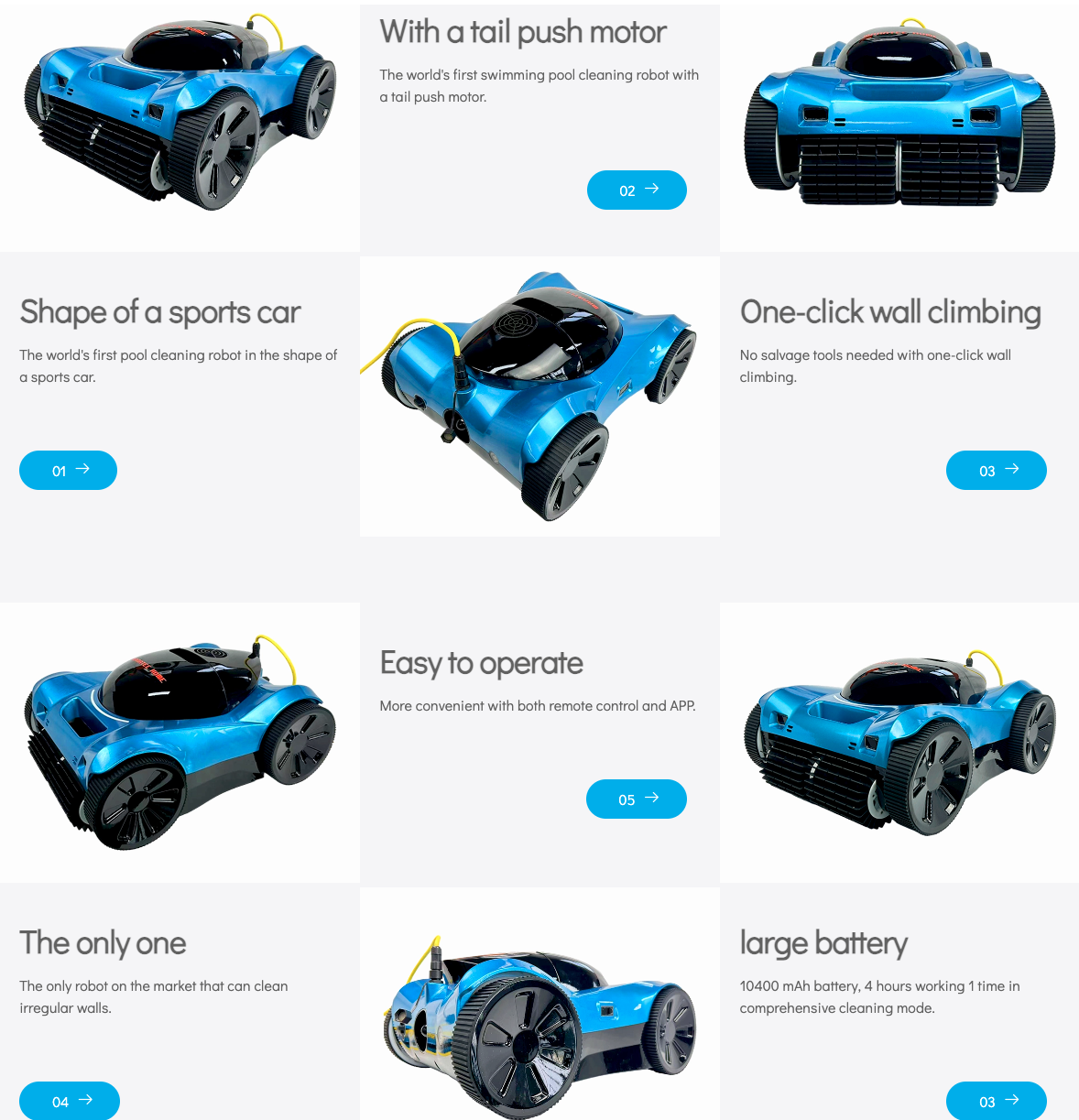Views: 0 Author: Site Editor Publish Time: 2025-09-18 Origin: Site











Owning a pool can be rewarding, but maintenance often takes time, effort, and regular service. Debris, algae, and water chemistry require constant attention to keep your pool clean, safe, and inviting. That’s where robotic pool cleaners come in. These smart devices automate cleaning tasks, scrubbing floors, walls, and waterlines while reducing chemical use, protecting your pool equipment, and minimizing the need for frequent manual service.
In this guide, we’ll explore whether you need a robotic pool cleaner, compare them to traditional suction- and pressure-side cleaners, highlight key features to look for. Our commitment to customer satisfaction extends long after your purchase. We provide reliable after-sales support to ensure your continued satisfaction, giving you peace of mind while enjoying a sparkling, healthy pool.
Not all automatic cleaners work the same.
Suction cleaners attach to your pool pump. They rely on suction to move and collect debris. They are cheaper but often miss walls and waterlines. Using them can reduce pump efficiency and strain your filtration system.
Pressure-side cleaners use water pressure to navigate. Some need an extra booster pump, which increases electricity costs. They handle leaves well but may not scrub surfaces thoroughly.

When choosing a robotic pool cleaner, several key features can make a significant difference in its performance and longevity. Here are the top features to consider:
A robust filtration system is crucial for capturing fine debris efficiently. Look for a cleaner with a high - efficiency filter that can remove small particles, ensuring that your pool water remains clear and clean. An effective filtration system not only improves water quality but also reduces the workload on your pool’s main filtration system.
The type of brush used in the robotic cleaner can greatly impact its cleaning effectiveness. Active brushes that rotate and scrub surfaces are essential for removing algae and dirt. These brushes can reach into corners and crevices, ensuring a thorough clean. Some models come with multiple brush types or adjustable brushes to handle different surfaces and debris types.
Full coverage is essential for maintaining a clean pool. Ensure that the robotic cleaner you choose can effectively clean walls and the waterline in addition to the floor. Many models come with advanced navigation systems that allow them to cover all surfaces evenly, preventing the buildup of algae and dirt in hard - to - reach areas.
Modern robotic pool cleaners often come with smart controls that offer a high degree of convenience. Look for models that can be operated via an app, timer, or remote control. These features allow you to schedule cleanings, adjust settings, and monitor the cleaner’s status from anywhere. Smart controls not only save time but also provide greater flexibility in managing your pool’s maintenance.
Robotic pool cleaners have revolutionized pool maintenance, offering a range of benefits that make pool ownership more enjoyable and hassle-free. These advanced devices provide convenience, efficiency, and superior cleaning capabilities, ensuring that your pool remains clean and hygienic with minimal effort.
One of the most significant advantages of owning a robotic pool cleaner is the unparalleled convenience it offers. Simply plug it in, set it up, and let it go to work. There’s no need for manual vacuuming, which can be time-consuming and labor-intensive. This hands-off approach allows you to enjoy your pool without the hassle of regular maintenance.
Robotic pool cleaners are designed to be energy-efficient, using significantly less electricity than traditional pump-driven cleaners. This not only reduces your energy bills but also minimizes your environmental impact. By operating independently of your pool’s filtration system, these cleaners can save you money in the long run.
Robotic pool cleaners are known for their superior cleaning capabilities. They are designed to scrub walls, floors, and the waterline evenly, ensuring that every part of your pool is thoroughly cleaned. This comprehensive cleaning action helps maintain a hygienic environment, reducing the risk of algae and bacteria buildup.
By taking over the cleaning duties, robotic pool cleaners reduce the wear and tear on your pool’s pumps and filtration system. This can extend the lifespan of your equipment, saving you money on repairs and replacements. With a robotic cleaner, your pool’s main filtration system can focus on maintaining water quality rather than cleaning the pool.
Many robotic pool cleaners come with the ability to schedule cleanings automatically. This feature allows you to set the cleaner to operate at specific times, ensuring that your pool is always clean and ready for use. Automated scheduling is particularly useful for busy households or for those who prefer to enjoy a clean pool without having to think about maintenance.

While robotic pool cleaners offer numerous benefits, they may not be necessary in every situation. Here are some scenarios where you might not need a robotic pool cleaner:
If you have a small pool that doesn’t accumulate much debris, a robotic cleaner might be overkill. Smaller pools often require less maintenance, and manual cleaning or basic pool skimmers might be sufficient to keep the water clean and clear. In such cases, the investment in a robotic cleaner may not be justified by the amount of time and effort saved.
If your pool is regularly maintained by professional pool cleaning services, you may not need a robotic cleaner. Professional cleaners typically have the expertise and equipment to keep your pool in top condition, reducing the need for additional automated cleaning solutions. Regular professional maintenance can ensure that your pool remains clean and well-maintained without the need for a robotic cleaner.
Robotic pool cleaners can be a significant investment, with high upfront costs. If you have a limited budget, the expense of purchasing a robotic cleaner might be prohibitive. In such cases, it might be more practical to stick with manual cleaning methods or invest in other pool maintenance tools that are more affordable and still effective in keeping your pool clean.
Robotic cleaners are pricier upfront than suction or pressure cleaners. Premium models with advanced features cost more but offer long-term convenience.
Clean filters after every use
Replace brushes and belts periodically
Check cables and motors
Consumes electricity but less than pump-driven systems
Saves water by reducing backwashing
| Expense Type | Typical Frequency | Notes |
|---|---|---|
| Filter Cleaning | After each use | Maintains suction efficiency |
| Brush Replacement | Every 6-12 months | Depends on pool debris and frequency |
| Energy Cost | Ongoing | Lower than pressure-side cleaners |
| Battery Replacement | Every 2-4 years | Only battery-powered models |
Consider your pool and lifestyle:
Pool Size & Shape: Large or irregular pools benefit most
Debris Levels: Trees, dirt, or pets increase need
Frequency of Use: Frequent swimmers require cleaner water
Automation Desire: Want hands-off cleaning? Robotic is ideal
Budget: Upfront cost higher but long-term savings possible
Decision Checklist:
| Factor | Consideration | Recommendation |
|---|---|---|
| Pool Size | Small vs. Large | Robotic cleaner for large pools |
| Debris Level | Low vs. High | Robotic cleaner for high debris |
| Maintenance Effort | Minimal vs. Hands-on | Robotic reduces effort |
| Budget | Low vs. High | Robotic has higher upfront cost |
Typically 3-5 times per week, depending on debris levels.
Most models handle small leaves; large debris may need manual removal.
Yes, filtering debris reduces cloudiness and chemical use.
5-10 years with proper care and maintenance.
No, extended submersion damages seals, electronics, and battery life.
Robotic pool cleaners from Shandong Addotron Robotics Technology Co., Ltd. simplify pool maintenance, save time, and protect your equipment. Their advanced models efficiently scrub floors, walls, and waterlines while reducing chemical use. Before purchasing, consider your pool size, debris level, and budget. Combining an Addotron robotic cleaner with occasional professional maintenance ensures a sparkling, safe, and healthy pool year-round.